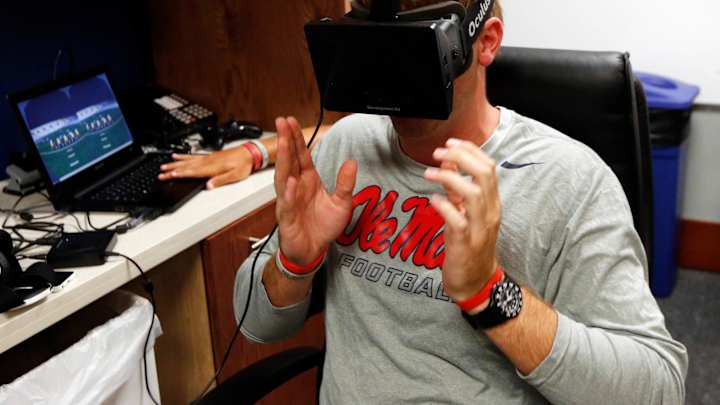Football's future? QBs training with virtual reality

OXFORD, Miss. (AP) Mississippi quarterback Ryan Buchanan straps on a headset that covers his eyes, and instantly, he sees a scene that looks like a video game, all set from his perspective.
In about a minute, he runs through a handful of plays, checking his receivers, deciphering defensive coverages and making split-second decisions about where to throw the football.
And just like that, practice is over.
''I felt like I was in the future putting this thing on - something that you would see on TV shows,'' Buchanan said with a wide grin.
Getting a few ''mental reps'' has never been easier at Ole Miss: The Rebels are one of a growing number of football programs in the NCAA and NFL dabbling in virtual reality technology to help supplement work on the field.
Buchanan is one of three Ole Miss quarterbacks fighting for the starting job this fall. Part of their offseason regimen has been 10 tests on the simulator that include 20 plays each.
When it's time for the test, Buchanan can look around just like in real life, with a complete 360-degree field of vision. He hears the play call from a coach or another player and then checks the formation and reads the defense pre-snap. After the ball is snapped, he watches how the defense reacts and then turns his head to the player he wants to receive the ball.
If it's the right choice, the ball flies through the air and connects with the receiver. If not, the simulator informs the QB a wrong decision has been made.
The tests can even be loaded onto a smartphone app and then the phone can be placed into a portable headset. Quarterbacks could theoretically do the tests from home and then the results can be emailed to coaches.
''You do it over and over again, watching where guys go and seeing where windows open up on certain plays,'' Buchanan said. ''It's pretty much what you see on the field.''
Ole Miss is using a program developed by EON Sports, which is a subsidiary of EON Reality based in California. UCLA, Kansas, Syracuse, the Tampa Bay Buccaneers and about 100 high schools are among EON's clients. Brendan Reilly - the company's 28-year-old CEO - says more potential clients are in the works and interest has been high.
Reilly said EON's software was partially developed from programs that do things like train fighter pilots and help doctors practice surgeries.
''Coaches already know how to make guys big and strong,'' Reilly said. ''Now they want to figure out how to get them to make consistently better decisions on the field. We're figuring out ways to use data and technology to make that happen. And if you can game-ify the process to make it more enjoyable, players will hopefully embrace that.''
Ole Miss graduate assistant Robert Ratliff spent several hours using the EON Sports software to install the team's offense into the system. He's also working on simulating defensive alignments for teams that the Rebels will face this season.
He said once the base system is installed, changing, adding or deleting plays isn't too difficult.
There is also a version of the simulator that uses real-life footage from the quarterback's perspective instead of a video game simulation. Ratliff said that version makes things more realistic, but once the video is taken, there is no way to change the play without filming another one.
EON Sports isn't the only company vying for clients in the world of virtual reality. A company called STRIVR also has a growing list of clients, including Auburn, Arkansas, Stanford, the Minnesota Vikings and the Dallas Cowboys.
''You're always looking for things to help you get better,'' Auburn coach Gus Malzahn said. ''The quarterback is one position that you can actually get some mental reps. Even if it's mental, it can help you in the fall.''
Not everything can be simulated of course: The weather is always perfect when staring through the headset, the pocket stays relatively clean for the quarterback and the receivers always run a perfect route.
''And, of course, there aren't guys out there trying to kill you,'' Buchanan said laughing.
But the general consensus is the technology is only going to get better. And with limited practice time during the preseason, giving quarterbacks extra time to learn the playbook probably isn't a bad thing.
It's also a way to avoid risking fatigue or injury on the field. Minnesota Vikings coach Mike Zimmer said second-year quarterback Teddy Bridgewater immediately embraced the new training.
''It's going to be very helpful from the learning curve, for not only me but for other guys in the room,'' Bridgewater said. ''We have backups who won't get the same amount of reps that I will get throughout the course of game week, so for them to be able to go in and steal reps is going to be very helpful.''
Will it actually help the Vikings win more football games?
Zimmer isn't sure, but it's worth a shot.
''The jury is still out, but I think with the age of guys that we have now and the video games and all the things that they have, Teddy really liked it when he saw it,'' Zimmer said. ''People we've talked to, they really like it.''
-----
AP Sports Writers John Zenor, Jon Krawczynski and Dave Campbell contributed to this story.
-----
Follow David Brandt on Twitter: www.twitter.com/davidbrandtAP
